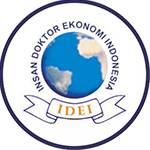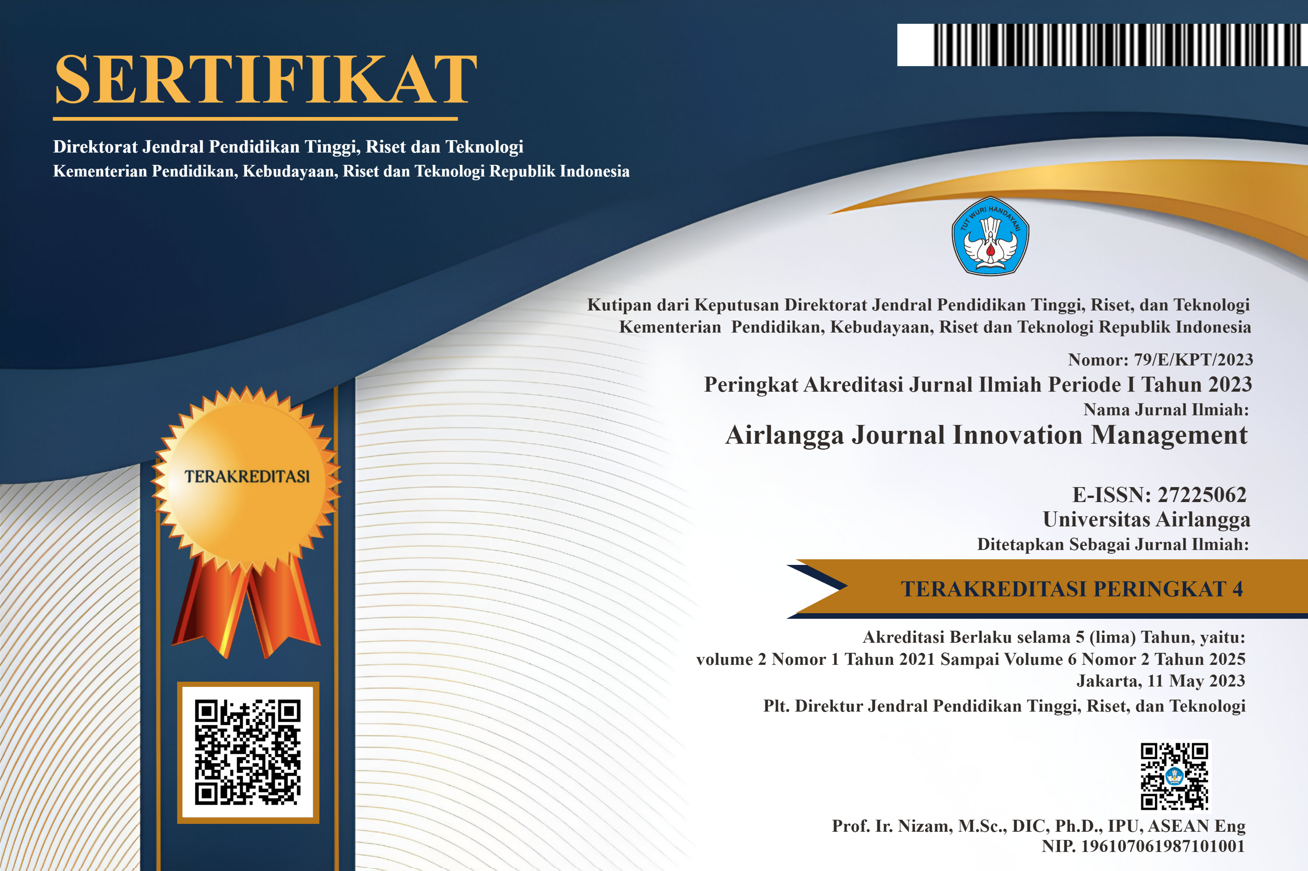Implementation of Competitive Adaptation and Resilience Strategies Post Covid-19 Pandemic in Halal Food SMEs
Downloads
SME industry saves the nation's economy, 10.79 million people (7.71 percent) of the Indonesian population work in providing accommodation and food. Knowing the survival ability of industry players on a mike scale is very important. This study used a mixed method, with descriptive analysis to determine the survival ability of the "Pempek Bicik Nina", Palembang, company post-pandemic. Using the SWOT analysis, and internal-external weighting, the Four Step Strategy determines the most appropriate strategy, to be able to overcome challenges by taking advantage of all possible opportunities. Results showed that several weaknesses must be immediately corrected to optimize revenue potential, in the form of more extensive digital marketing, and innovation in product variants, including embracing more public figures as catalysts to leverage. Innovation in product variants is also needed to maintain the attractiveness so that it can continue to attract old customers, as well as attract the interest of new consumers. The cost leadership strategy was maintained. The ability to control costs, and operational efficiency, is very important to maintain profitability and competitiveness. By adapting to all digital world business developments and its product innovation, "PBN", can maintain business continuity. In particular, by combining digital marketing strategies, product innovation, embracing more public figures, and cost leadership strategies, halal SMEs "PBN" can continue to develop and succeed in the halal SME culinary market.
Achsa, A., Verawati, D.M., Novitaningtyas, I. (2023). Implementation of Marketing Strategy Innovation and Business Model Development: Study of SMEs in Tourism Village. Airlangga Journal of Innovation Management, 4(2), 172-184
Agustina, T.S. (2021). The Study of SME's Performance in Furniture Carving Industry. Airlangga Journal of Innovation Management, 2(2), 141-153
BPS RI. (2020). Analysis of SE2016 Results Continued: Potential for Increasing the Performance of Micro and Small Enterprises. Jakarta: Central Statistics Agency.
Kusumaningrum, D.A., Pangestu, N.D., Yolanda, D., Putra, R.H.O. (2021). Culinary Micro Small Enterprises (UMK) Strategy in Facing the Covid-19 Pandemic in Jakarta, Journal of Business Disruption, 4 (6), 551 - 565.
Hany Setyorini, H; Effendi, Mas'ud; and Imam Santoso. (2016). Marketing Strategy Analysis Using the SWOT Matrix and QSPM (Case Study: WS Soekarno HattaMalang Restaurant). Industria: Journal of Agro-Industrial Technology and Management, Vol. 5(1).
Loestefani, V., Poan, R., Suwitorahardjo, B., & Wardhana, A. K. (2022). Service Quality and Product Quality as An Influence on Customer Loyalty at Naturalis Koffie. FIRM Journal of Management Studies, 7(2), 211–236.
Mendo, A. Y., Singh, S. K., Yantu, I., Hinelo, R., Bokingo, A. H., Dungga, E. F., Juanna, A., Wardhana, A. K., Niroula, B., & Win, T. (2023). Entrepreneurial leadership and global management of COVID-19: A bibliometric study. F1000Research, 12(31), 31.
Muflih, M., & Juliana, J. (2020). Halal-labeled food shopping behavior: the role of spirituality, image, trust, and satisfaction. Journal of Islamic Marketing. https://doi.org/10.1108/JIMA-10-2019-0200
Pratiwi, A. C., Wardhana, A. K., & Rusgianto, S. (2022). Application of Vector Error Correction Model on Macroeconomic Variables toward Changes in the Composite Stock Price Index. Daengku: Journal of Humanities and Social Sciences Innovation, 2(2), 219–229.
Poernamasari, D.W. (2023). The Effect of Profit-Sharing on Productivity of Micro, Small, and Medium Enterprises (MSME) in Indonesia. Airlangga Journal of Innovation Management, 4(2), 198-207. https://doi.org/10.20473/ajim.v4i2.48385
Rahmi, F., Sayekti, C. D. D., Dahar, R., & Yanti, N. S. P. (2023). Analisis Cost Volume Profit (CVP) Sebagai Alat Perencanaan Laba pada UMKM Pempek Palembang MWR. Jurnal Ekonomi Dan Bisnis Dharma Andalas, 25(1), 64–73.
Ryandono, M. N. H., Mawardi, I., Rani, L. N., Widiastuti, T., Ratnasari, R. T., & Wardhana, A. K. (2022). Trends of research topics related to Halal meat as a commodity between Scopus and Web of Science: A systematic review. F1000Research, 11(1562), 1562.
Siagian, et al. (2019). Analisis Faktor Eksternal dan Internal Terhadap Kinerja UMKM di Kota Batam. Jesya: Jurnal Ekonomi & Ekonomi Syariah. 2(2). 265-271
Wardhana, A. K. (2020). Should be halal? is there any correlation between halal and vaccine? bibliography study in SCOPUS indexed academic paper. Journal of Halal Product and Research (JHPR), 3(2), 80–87. https://doi.org/https://doi.org/10.20473/jhpr.vol.3-issue.2.80-87
Wardhana, A. K. (2021). THE IMPACT OF THE PRO AND CONS POLICIES IN JOKOWI ERA'S ON THE MACRO ECONOMY OF SOCIETY. Jurnal Ekonomi Dan Bisnis Airlangga, 31(2), 124–136. https://doi.org/https://doi.org/10.20473/jeba.V31I22021.124-136
Wardoyo et al. (2015). PENGARUH ORIENTASI KEWIRAUSAHAAN TERHADAP STRATEGI USAHA DAN KINERJA BISNIS UMKM DI DESA UJUNG-UJUNG, Kec. PABELAN, Kab SEMARANG. Proceeding of International Conference Sustainable Competitive Advantage. 1-19
Wargadalem, F. R., Wasino, & Yulifar, L. (2023). Pempek Palembang: history, food making tradition, and ethnic identity. Journal of Ethnic Foods, 10(1), 45.
Wijayanti, I., Herianingrum, S., & Ryandono, M. N. H. (2020). Islamic Crowdfunding Mechanism to Answer Renewable Energy Investment Challenge in Indonesia. Test Engineering and Management, 83, 3596–3605.
Zaki, I., Herianingrum, S., Hapsari, M. I., Bayuny, A. F. R., & Wijayanti, I. (2024). Diversifikasi Pengolahan Frozen Nugget, Pengemasan dan Pemasaran Google Bisnis. JILPI: Jurnal Ilmiah Pengabdian Dan Inovasi, 2(3), 1–10.
Zakik, Z., Kamil, A., Prasetyo, A. S., Ryandono, M. N. H., & Wijayanti, I. (2022). Economic development on Madura Island through halal tourism: A business feasibility study. Al-Uqud: Journal of Islamic Economics, 6(2), 289–303.
Copyright (c) 2024 Airlangga Journal of Innovation Management

This work is licensed under a Creative Commons Attribution-NonCommercial-ShareAlike 4.0 International License.
- The journal allows authors to hold copyright without restrictions and retain publication rights without restrictions. The author retains the copyright and grants the first publication rights to the journal, with his work simultaneously licensed under the Creative Commons Attribution-NonCommercial-ShareAlike 4.0 International License (CC BY-NC-SA). This license allows others to share the work with acknowledgment of authorship and initial publication in this journal, provided that the work is not used for commercial purposes and that any derivative works must use the same license.
- Authors may enter into additional contractual agreements for non-exclusive distribution of the journal publication version (e.g., uploading it to an institutional repository or publishing it in book form), while still including acknowledgment of the initial publication in this journal.
- Authors are allowed and encouraged to upload their work online (e.g., in an institutional repository or personal website) before and during the submission process. This can support productive scientific exchanges as well as increase citations to published works.

AJIM by UNAIR is licensed under a Creative Commons Attribution-NonCommercial-ShareAlike 4.0 International License.





















